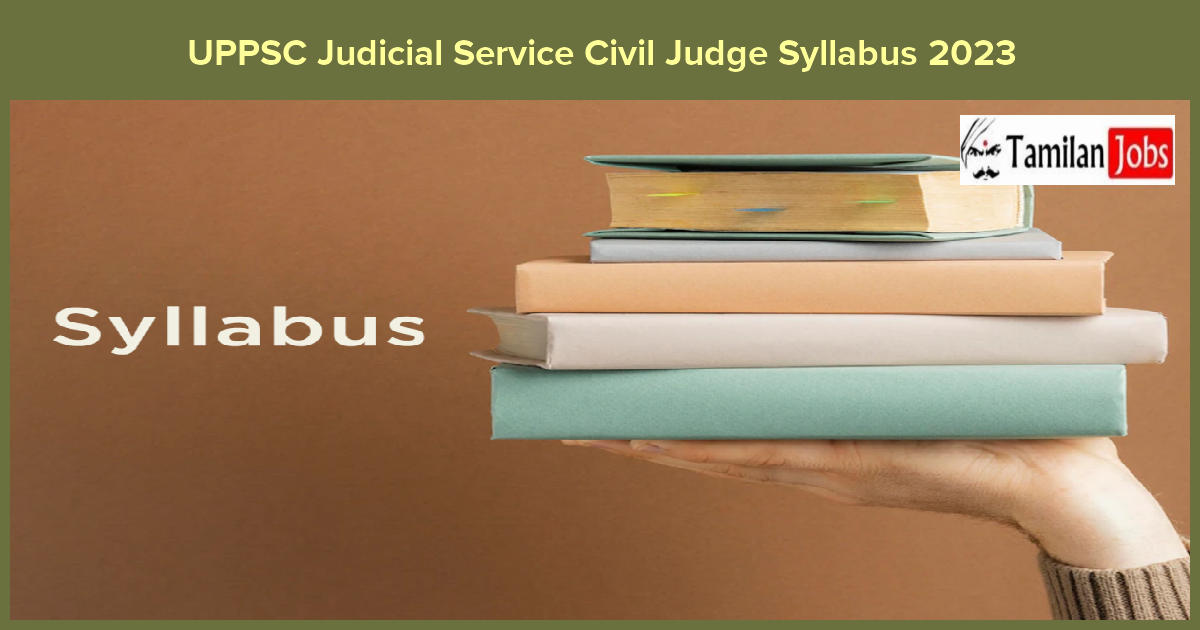UPPSC Judicial Service Civil Judge Syllabus 2023 Check Exam Pattern (Prelims, Mains) Here: Uttar Pradesh Public Service Commission (UPPSC) has going to conduct the written examination for U.P. Judicial Service Civil Judge (Junior Division) Examination-2022. Applicants who have all applied for the Group – B Civil Judge (Junior Division) and who have all waiting for the exam pattern, as well as the syllabus PDF now, can check out this article completely. As the UPPSC Judicial Service. For easy access, We have attached the direct download link below. Aspirants make use of the below link.

Uttar Pradesh PSC Judicial Service Civil Judge Syllabus 2023 – Overview
| UPPSC Judicial Service Civil Judge Exam Syllabus 2023 | |
| Organization Name | Uttar Pradesh Public Service Commission (UPPSC) |
| Exam Name | U.P. Judicial Service Civil Judge (Junior Division) Examination-2022 |
| Post Name | Group – B Civil Judge (Junior Division) |
| Category | Syllabus |
| Selection Process | Preliminary examination, Main (written) Examination, and Interview |
| Job Location |
Uttar Pradesh |
| Official Site |
uppsc.up.nic.in |
U.P. Judicial Service Civil Judge Exam Pattern 2023
UPJS Prelims Exam Pattern 2023
| Sl No. | Paper | Marks | Time |
| 01. | Paper I: General Knowledge | 150 | 2 hours |
| 02. | Paper II: Law | 300 | 2 hours |
UPJS Mains Exam Pattern 2023
| Sl No. | Paper | Marks |
| 01. | Paper I: General Knowledge | 200 |
| 02. | Paper II: English Language | 100 |
| 03. | Paper III: Hindi Language | 100 |
| 04. | Paper IV: Law-I (Substantive Law) | 200 |
| 05. | Paper V: Law-II (Procedure and Evidence) | 200 |
| 06. | Paper VI: Law-III (Penal, Revenue, and Local Laws) | 200 |
UPPSC Judiciary Syllabus 2023 for Prelims Exam
Paper 1 – General Knowledge
This paper may include questions based on topics relating to History of India and Indian Culture, Geography of India, Indian Polity, Current National Issues and topics of Social relevance including sensitivity to persons with disabilities, senior citizens and offences on women and children with special references to the salient features of the Rights of Persons with Disabilities Act, 2016, Maintenance and Welfare of Parents and Senior Citizens Act, 2007, Dowry Prohibition Act, 1961, Protection of Women from Domestic Violence Act, 2005, Sexual Harassment of Women at Workplace (Prevention, Prohibition and Redressal) Act, 2013, Pre-Conception and Pre-natal Diagnostic Techniques (Prohibition of Sex Selection) Act, 1994, Medical Termination of Pregnancy Act, 1971, Indecent Representation of Women (Prohibition) Act, 1986, Protection of Children from Sexual Offences Act, 2012, India and the world, Indian Economy, International Affairs and Institutions and development in the field of Science and Technology, Communications and Space. The nature and standards of questions in this paper will be such that a well-educated person will be able to answer them without any specialized study.
Paper 2 – Law
This paper will include day-to-day happenings around India and the world, particularly in Legal spheres, Acts, and laws.
(i) Jurisprudence
(ii) International Organisations
(iii) Current International Affairs
(iv) Indian Constitution
(v) Transfer of Property Act
(vi) Indian Evidence Act
(vii) Indian Penal Code
(viii) Civil Procedure Code
(ix) Criminal Procedure Code
(x) Law of Contract
UP Judiciary Syllabus 2023 for Mains Exam
Paper I: General Knowledge
This paper may include questions based on topics relating to History of India and Indian Culture, Geography of India, Indian Polity, Current National Issues and topics of Social relevance including sensitivity to persons with disabilities, senior citizens and offences on women and children with special references to the salient features of the Rights of Persons with Disabilities Act, 2016, Maintenance and Welfare of Parents and Senior Citizens Act, 2007, Dowry Prohibition Act, 1961, Protection of Women from Domestic Violence Act, 2005, Sexual Harassment of Women at Workplace (Prevention, Prohibition and Redressal) Act, 2013, Pre-Conception and Pre-natal Diagnostic Techniques (Prohibition of Sex Selection) Act, 1994, Medical Termination of Pregnancy Act, 1971, Indecent Representation of Women (Prohibition) Act, 1986, Protection of Children from Sexual Offences Act, 2012, India and the World, Indian Economy, International Affairs and Institutions and development in the field of Science and Technology, Communications and Space. The nature and standards of questions in this paper will be such that a well-educated person will be able to answer them without any specialized study.
Paper II: English Language
This paper will be 100 marks. It shall comprise three questions as specified below
(i) Essay – 50 marks
(ii) Precis Writing – 30 marks
(iii) Translation of Passage from Hindi to English – 20 marks
Paper III: Hindi Language
This paper will be 100 marks. It shall comprise three questions as specified below:-
(i) Essay: 50 marks
(ii) Precis writing: 30 marks
(iii) Translation of passage from English to Hindi: 20 marks
Paper IV: Law-I (Substantive Law)
This paper will be of 200 marks. The question set will be restricted to the field covered by:- The law of contracts, the law of Partnership, the law concerning easements and torts, the Law relating to the transfer of property including the principles of equity, specifically applicable thereto, the principal of Equity with special reference to the Law of trust and specific relief, Hindu Law and Mohammedan Law, and Constitutional Law. There shall be questions of 50 marks in relation to Constitutional Law alone.
Paper V: Law-II (Procedure and Evidence)
This paper will be of 200 marks. And the questions set will be restricted to the field covered by the law of evidence, the Criminal Procedure Code and the Code of Civil Procedure, including the principles of pleading. The question set will relate mainly to practical matters such as the framing of charges and issues the methods of dealing with the evidence of witnesses the writing of judgment and the conduct of cases generally but will not be restricted to them.
Paper VI: Law-III (Penal, Revenue, and Local Laws)
This paper will be of 200 marks. Moreover, the Questions set will be restricted to the field covered by-Indian Penal Code, Uttar Pradesh Revenue Code, 2006, Uttar Pradesh. Urban Building (Regulation of Letting, Rent, and Eviction) Act, 1972, the Uttar Pradesh Regulation of Urban Premises Tenancy Act, 2021, Uttar Pradesh Municipalities Act, U.P. Panchayat Raj Act, U.P. Consolidation of Holding Act, 1953, Uttar Pradesh Urban (Planning and Development) Act 1973, together with rules framed under the aforesaid Acts. Answers to the questions about Local Laws will be compulsory. Questions pertaining to Penal Laws will be 50 marks, whereas, that of Revenue and Local Laws will be 150 marks.

